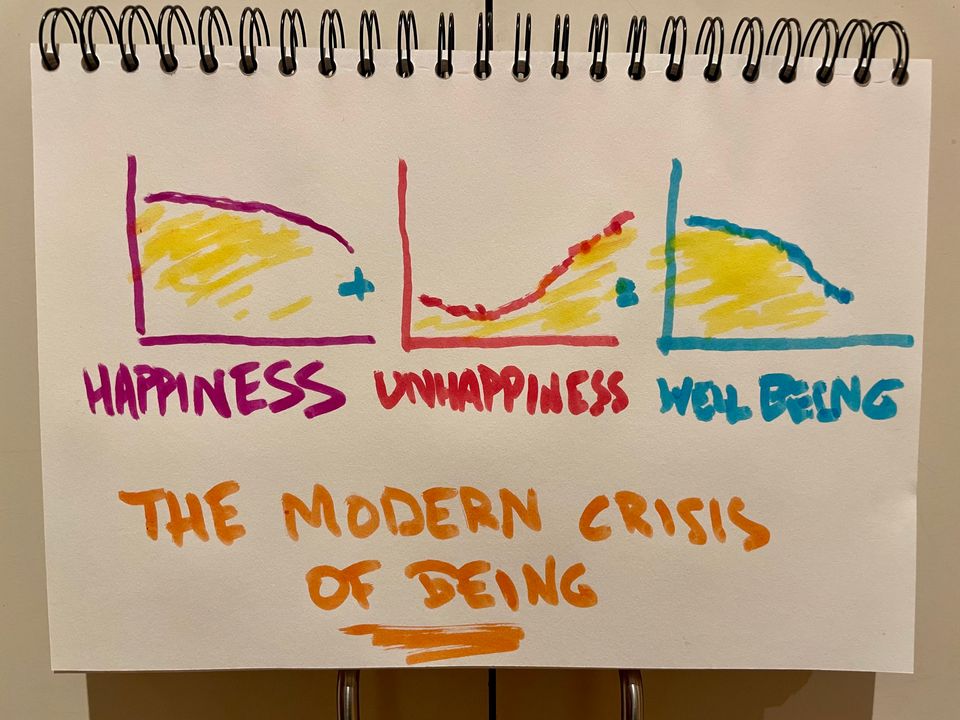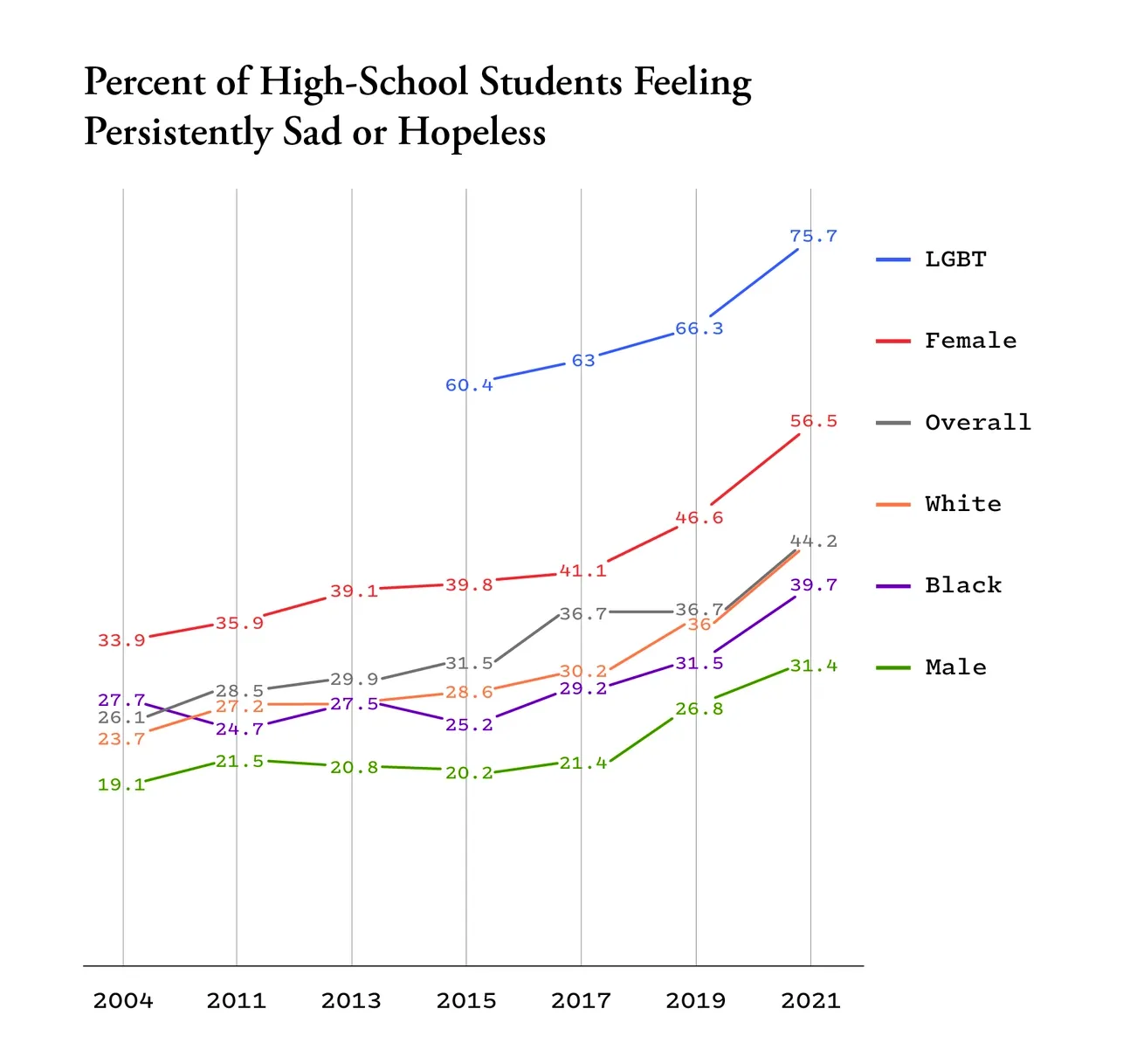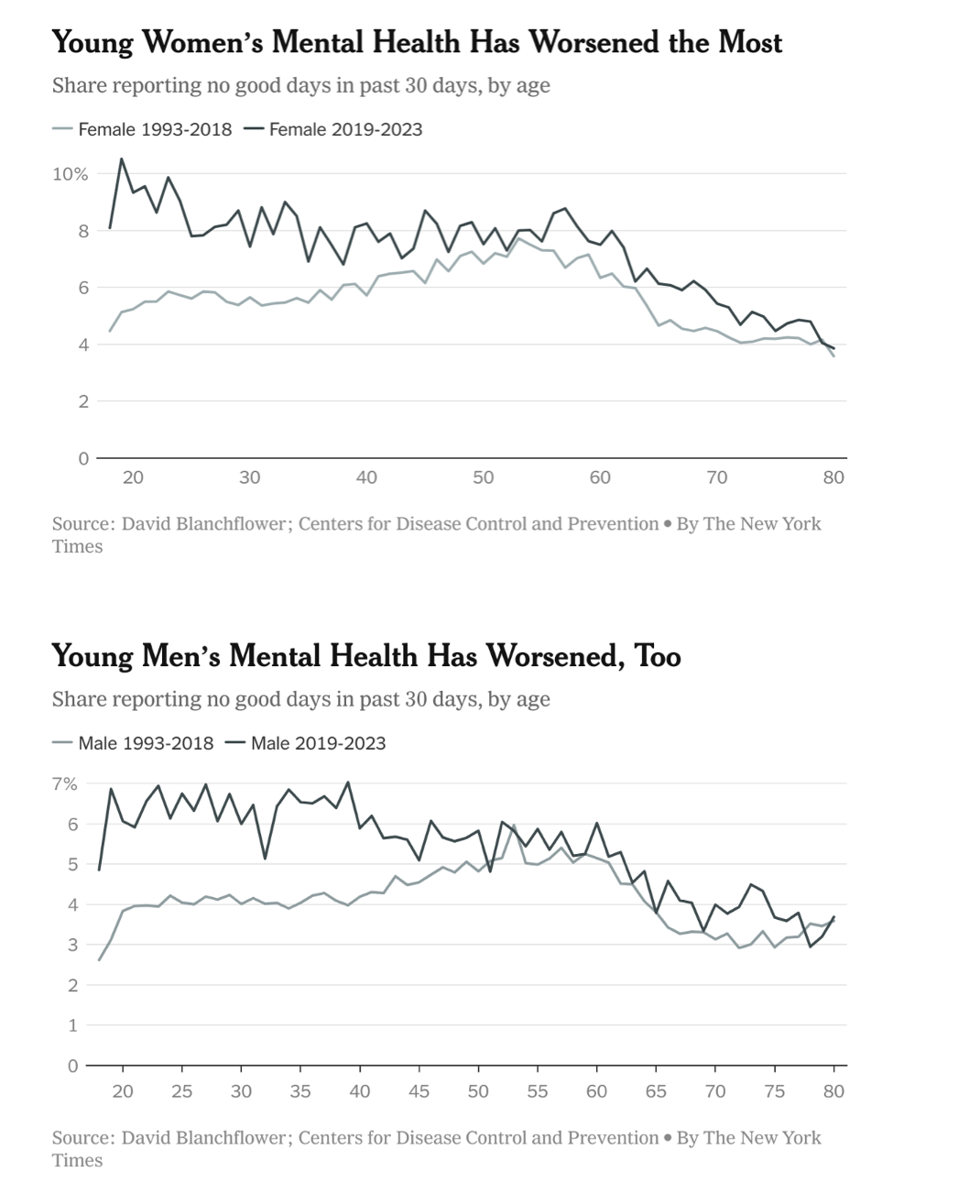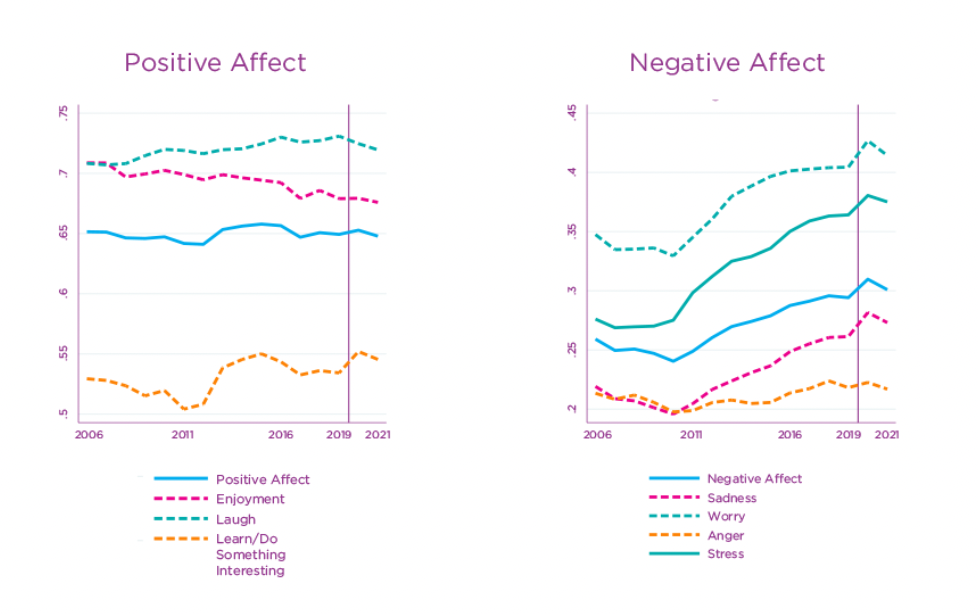The Modern Crisis of Being

If you watched the latest video, about Meta's AI celeb chatbots failing—I know, dude, why are you even talking about this dumb nonsense—hold, on there was a reason. It was a set of thoughts on a much deeper Issue. Superficial stuff, to be sure—but the Issue behind it isn't.
I've come to call it the Modern Crisis of Being.
What do you see when you look at the world today? Crisis, of course. But. Not just economic, financial, political, social. Deeper still, there are a number of interlinked crises afflicting people's hearts and souls. Their mental, emotional, relational well-being. And while we treat them as distinct, I don't think they are: I think they're part of one larger Crisis of Being. And when you look into it, the results are dire...striking...and profound. At least they are to me.
What do I mean by all that? Let's take it step by step.

There's come to be what's often called the "Loneliness Epidemic." And the numbers are dire. Friendship itself seems to becoming a luxury. Human connections—the real things, not "parasocial relationships," meaning social media, by and large—are harder and harder to come by. In economics-speak, we might say: the costs of social ties are rising to a point where they're becoming unaffordable for people to build, maintain, and renew.

Meanwhile, there's also a "mental health crisis," especially amongst youth. I don't like that term, because if anything, it understates just how severe the problem is. About half of American kids feel "persistently hopeless." Rates of depression, anxiety, and suicide have soared. "Deaths of despair," as two of the world's best economists have termed them, studying them deeply, are becoming endemic. These are dire, shocking indicators.
But these crises are hardly distinct. If anything, they're flipsides of one another. Where does happiness, and let's just use the term loosely, as the absence of despair, anxiety, hopelessness, for now, come from? What we know is that the single most powerful source of happiness there is are...relationships. So it's hardly a surprise to see unhappiness skyrocket and explode while social ties rupture and implode. That's not a coincidence, it's a relationship.
At the same time, societies are growing, of course, "hyperpolarized." That's a political term, but a truer way to think about it is: people regard one another with suspicion, hostility, outright enmity. Moral violations trigger feelings of rage. Demagogues egg on hate and point the finger at scapegoats. All this too is a reflection of...
The Modern Crisis of Being.
Now we can begin to define it a little more fully. What does that phrase mean? On one level, it's brutal out there. But not just economically, though that's certainly true, or financially, or even relationally. Rather, all those add up to a place in the human experience where just existing is difficult. Fraught with strife. Tense. Lonely. Bitter.

There's always the sense these days, that something could go wrong. Suddenly. You don't know what'll happen next. This is what produces the spiraling rates of anxiety that we see in society after society.
There's the feeling rising that nothing's going right—and that it won't, for a very long time, or maybe "never," at least insofar as that applies to our lives. That's what produces the profound, devastating rates of pessimism we see around the world—huge majorities hold ultra-negative views about the future.
And there's the sense, too, that institutions and systems are rigged against you. When there's a problem, they don't solve it, and worse, they try to hide it from you, and worse still, they leave you the burden, pass along the risk to you. Hence, cratering rates of confidence and trust in institutions and systems around the globe.
The Modern Crisis of Being. Look at this chart. It's shocking. See how "negative affect" explodes? While "positive affect" flatlines? This is global data about happiness and well-being, and those results are, to put it mildly, catastrophic.

To me, that's one of the most striking images of the 21st century. It demonstrates to me without a shadow of a doubt that the Modern Crisis of Being is very real, global, enduring, and growing. Just being isn't a happy thing anymore. And before you do the well-worn grad school thing—"it never was!"—the point is that it's obvious to see from the trends above that the world is in a very, very bad place, not just economically, financially, politically, but right down in the soul.
People feel dispirited. Disheartened. Disillusioned, in profound ways. Think, again, for a moment, what it really says that half of young people feel hopeless. They are saying that they don't feel hope. Of course, that'd leave anyone profoundly depressed, just like it's leaving them. We gloss over statistics like these, how startling and meaningful they really are. But they speak volumes, perhaps louder and deeper, than the all the dry statistics about the economy and so forth. They are telling us that they are in a Crisis of Being.
But who isn't, these days?
Think now of some of the ways people are...responding to the abject trends above.
For one class, let's call them Rich Coastal Americans, or maybe Moneyed Westerners, there's a desperate search for "wellness." What does that tell you, though? That just being is pretty toxic, otherwise, why would you be obsessed with a search for "wellness"? It must mean, prima facie, by definition, that well-being is something's that hard to come by. It doesn't just cost a lot of money, it also requires a great deal of investment, knowledge, information, time, all of which are luxuries, in themselves.
But that, too, is in itself, a pointer to the Modern Crisis of Being. Why should well-being, which is just being, but not in a toxic, poisonous, pained, depressed, panicked, upset, disturbed, distorted way...be so hard to find?
Maybe you see my point a little bit.
For another social group, let's call them Lost Boys, the desperate search for well-being takes them in a different direction entirely. They fall prey, en masse, the Manfluencers, like Jordan Peterson and Russell Brand and Andrew Tate, who basically spin them tales of glorified Nietzscheanism on YouTube. The will to power, domination as the point of life, hierarchy as the only form of social order, the purpose of human existence to defy morality, and become a Master over Slaves.
If you're a desperate, lonely young man, unable to find a job, a mate, a partner, a direction in life—all this is incredibly seductive, because it makes you feel powerful, and orients you in a direction you can understand, since it's already couched in extant history and myths of masculinity. So then emerges a Crisis of Masculinity, as we've come to call it: why do all these boys fall for this stuff? Why do the algorithms keep promoting it? My cousin, a teacher, told me that boys in her class in India—ten year olds—use Andrew Tate chants to subjugate and harass the girls. Ten year olds in India.
The Crisis of Masculinity, too is, part of the Modern Crisis of Being. It's not just that we don't what a "man" is anymore. Rather, it's that none of us know what is to be in this age. I don't mean to sound Shakespearean. Rather, I'd prefer you understood that the way Heidegger meant it.
He said, famously, that we're all "thrown" into existence. Thrownness, like a ball, soaring through the air. We don't know who threw us. Why. Where we end. We just know we fall. Mortality, finitude, powerlessness—in the existential sense—all in Heidegger's perfect metaphor for being. The problem in this day and age is that the world's in chaos, and being tossed above it is all the more terrifying.
So we look, desperately, wherever we can, for something, anything, guidance, orientation, direction, a way to arrest the fall. And we do it the way that human beings, being pack animals, primates, do it, too—together, in our little tribes. So Moneyed Westerners search for "wellness." Lost Boys search for a point to their lives.
Shall I give you another example or two? Let's do a few just to drive the point home. What about Lost Girls? You see, we focus on boys, but the truth is that girls are in just as profound a crisis, too. There they are, being assaulted, and I mean that literally, over and over again—remember the ten year olds in India—by the fallout of the Modern Crisis of Being. And the answers that are given to them these days consist mostly of messages on social media platforms to make themselves hyperfeminine, caricatures of femininity, just as boys are taught to be caricatures of masculinity.
Then there's self-help, the Market That Refuses to Die. Why is that? Again, we're on a desperate, panicked search for well-being. Or maybe just neutral-being, trying to "help ourselves," from feeling these awful things so much, from lives being stuck, from perpetually hustling and grinding and going...not much of anywhere.
It doesn't work. None of this works, if we're honest. How do we know that?
Because well being keeps right on falling. If any of the above was working, it would be rising. But it's not. Instead, along almost every dimension, from mental health, to social ties, to relations, to mobility and upward motion, to finances...it's not.
And so we're in a kind of Existential Trap right now. We know we need help, but we don't know where to get it, or find it. Nothing we do seems to work, and life grows more and more tense, difficult, anxious, and weary by the day, month, year, so on the search goes. How do you even just be in age of collapse, crisis, ruin? The Modern Crisis of Being.
Some of us are good at pretending, by the way. Young people have become experts at that. They feel doomed and hopeless, but there they are, grinning on social media, not...revealing...the slenderest reed of such distress. Pretense is the last form of defense there is, really—and they know, having watched the rest of us toy with all these Ideas That Didn't Work, that they're bullshit, basically, and so all they're left with is...pretending everything's OK, because, hey, what can you about it, anyways?
All of this is the Modern Crisis of Being. I see it everywhere I look these days. It's ripping through our world like a Great Fire. It's searing our souls and incinerating our happiness. Torching our confidence, optimism, faith in tomorrow, trust in one another.
You're about to ask me: how do we repair all that? I understand the sentiment. I think that we begin at the beginning, which is by recognizing that we're all in this Crisis of Being. We're different only in that we search for different ways out, depending on which tribe we belong to, receiving different cues and messages and signals, often about stereotypes of who we are. But in the end, the One Thing That Unites Us All Today is that nobody much is happy with the way things are going. Their own lives. The status quo. More or less everyone, left, right, center, looks at the future and shudders. Rich Elite, Lost Boy, Underclass—doesn't matter, we're all doing the same thing right now, which is desperately, frantically searching for ways out of the Modern Crisis of Being.
Maybe if we understand that, then we make progress, step by step. If we really see each other, witness this shared sense of loss, grief, and despair we have, then perhaps, too, we can breathe, take it all in, and recognize: we're not so different from one another. We're not bitter adversaries in a senseless, stupid, endless struggle. We're here to give one another meaning, purpose, strength, courage, grace, and truth. I know we're a long way away from that. But we're going to have to begin somewhere, aren't we?
❤️,
Umair (and Snowy!!)
❤️ Don't forget...
📣 Share The Issue on your Twitter, Facebook, or LinkedIn.
💵 If you like our newsletter, drop some love in our tip jar.
📫 Forward this to a friend and tell them all all about it.
👂 Anything else? Send us feedback or say hello!
Member discussion